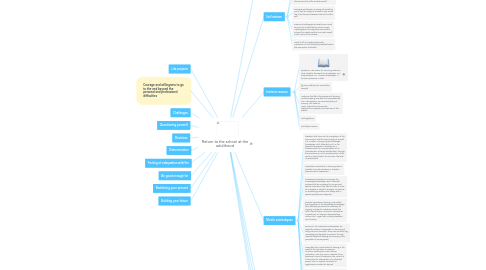Return to the school at the adulthood
作者:Delphine Pastre

1. Life projects
2. Courage and willingness to go to the end beyond the personal and professional difficulties
3. Challenges
4. Questioning yourself
5. Decisions
6. Determination
7. Feeling of adequation with/for
8. Be good enough for
9. Redefining your present
10. Building your future
11. Social self-esteem
11.1. Gaining importance in the others'eyes
11.2. Adhering to socio-economic ideologies of a system to avoid isolation and incomprehension
11.3. Need for recognition and feeling appreciated and "loved in our individual singularity
11.4. Need to feel accepted as an individual
11.5. Building Identity goes through social recognition
11.6. Identity tensions between the self and others which are defined by the gap between the image that one has of oneself and the image that one thinks that others have of oneself
11.7. Judgments / evaluations of our values
11.8. Mirror Neurons
12. Self esteem
12.1. Self-worth assessments and judgments
12.2. The gap between the self-image as it is (the actual self) and the self-image that one believes should be (identity tensions between the actual self and the normative self)
12.3. Discrepancy between an image of oneself as one is and an image of oneself as one would like to be (tensions between the self and the self)
12.4. Desire and willingness to satisfy one's need to prove to oneself that one has enough metacognitive and cognitive resources to achieve the objectives that one sets himself in the course of his studies
12.5. Need to fill an empty place by this impression of not having fully realized before the resumption of studies.
13. Intrinsic reasons
13.1. Epistemic: The reason for resuming studies is here linked to the search for knowledge, as a frequentation of a "cheerful knowledge", a source of pleasure in itself
13.2. Socio-affective (to meet other people)
13.3. Hedonics that fits in the pleasure of learning and developing new skills and competencies. The "atmosphere" and comfort places of training, The taste for Tools, materials or documents Bibliophile to cyberfan) are the basis of this pattern
13.4. Self-regulation
13.5. Self-determination
14. Motifs extrinsèques
14.1. Identities that focus on the recognition of the environment and the social image of oneself. It is a matter of acquiring the knowledge (knowledge, skill, attitudes) and / or the symbolic recognition necessary for a transformation (or a preservation) Of its characteristics of social identification, through the maintenance or the transformation of the social or family status, the function, the level of qualification.
14.2. Derivatives: enrollment in training makes it possible to avoid situations or activities experienced as unpleasant
14.3. Professional operations: to acquire the knowledge (knowledge, skills, attitudes) perceived to be necessary for carrying out specific activities in the field of work, in order to anticipate or adapt to changes, to discover Or perfecting practices, but always with a specific performance objective
14.4. Personal operations: training must enable the acquisition of the knowledge (knowledge, skill, attitudes) perceived as necessary for carrying out specific activities outside the field of work (leisure, family life, associative, humanitarian or religious responsibilities , Politics, etc.), again with a clearly identified aim of action
14.5. Economic: the reasons for participation are explicitly material. Participation in training will bring economic benefits. These can be direct (eg unemployment benefits) or indirect, through material benefits following the training (or the promotion it accompanies)
14.6. Prescribed: the commitment to training is the result of the injunction or pressure of others, evoking the most extrinsic motivation. This may How in discrete forms (pressure of social compliance, the council of a hierarchy, the intervention of a influential person, etc.) or explicit constraint of registration provided for by law)
14.7. Vocational: for this reason, the person seeks to acquire the knowledge (knowledge, skill, attitudes) and / or the recognition necessary for obtaining a job, its preservation, its evolution or its transformation. The reason for engaging in training is here centered on a logic of career guidance, career management or job search
14.8. Needs for "achievement"
14.9. finding back your self-autonomy
15. Reorientation
16. Demonstrate "resilience" to maintain cadence and visualize success
17. Concessions and adaptations
18. Distance and work-study education


